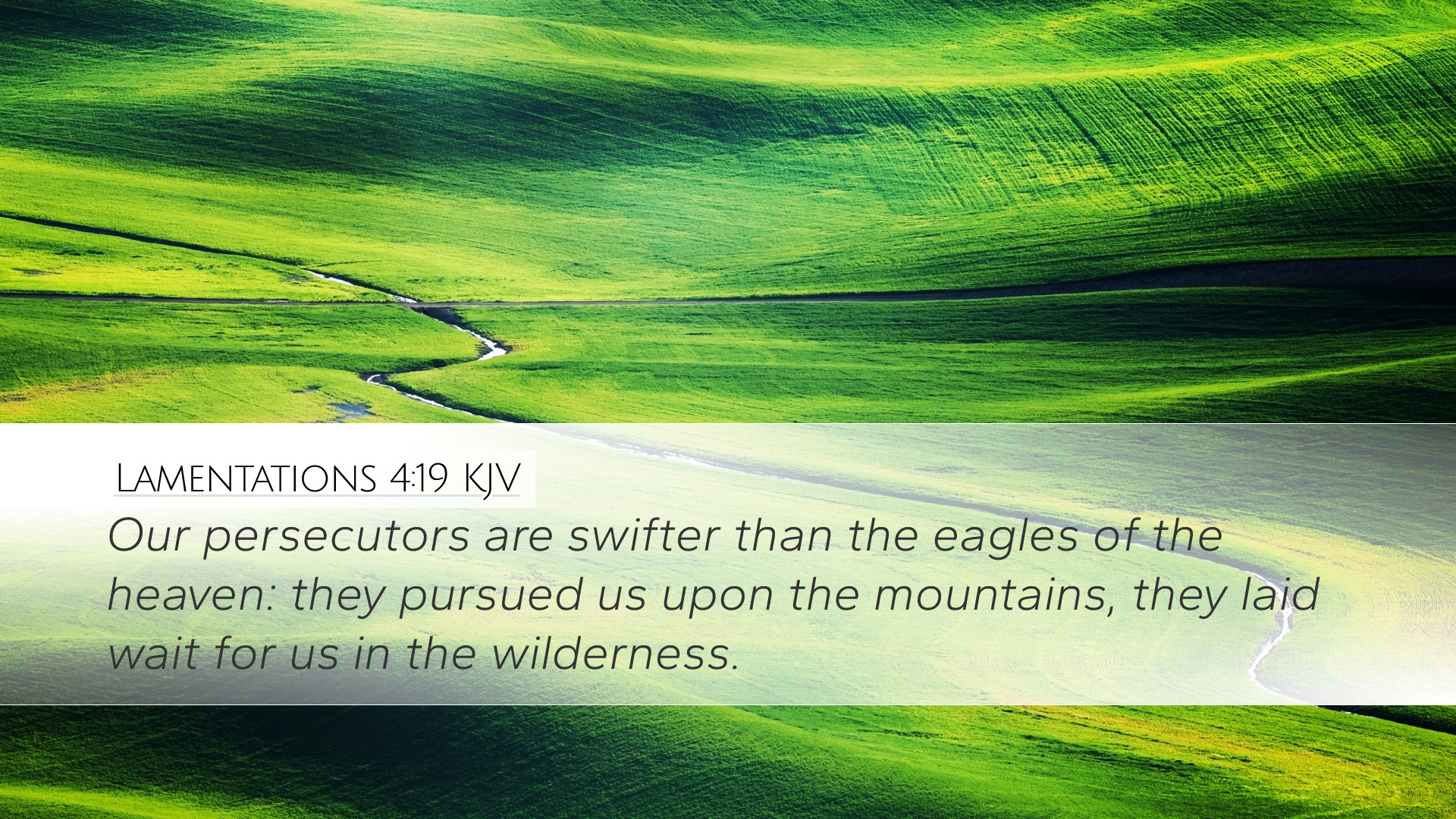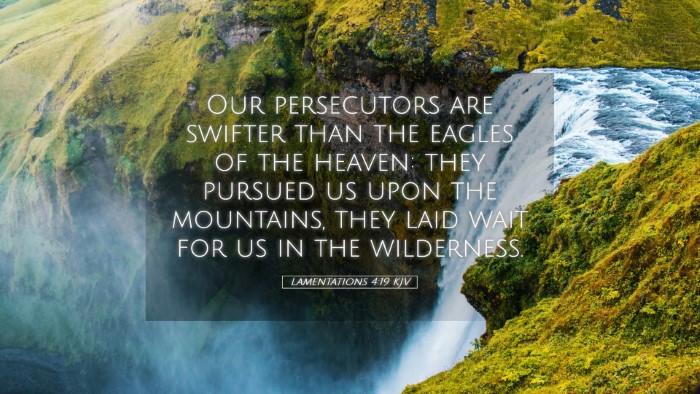Lamentations 4:19 - A Detailed Commentary
Verse: "Our persecutors are swifter than the eagles of the heavens: they chased us upon the mountains, they laid wait for us in the wilderness."
Introduction
The book of Lamentations, traditionally attributed to the prophet Jeremiah, serves as a poignant reflection on the suffering of the Israelites following the siege and destruction of Jerusalem. Chapter 4, in particular, encapsulates the despair and hopelessness experienced during this tumultuous period. Verse 19 metaphorically contrasts the aggressive pursuits of their adversaries with the swiftness and ferocity of eagles, illustrating a profound sense of vulnerability and urgency.
Insights from Public Domain Commentaries
Matthew Henry's Commentary
Matthew Henry offers a profound meditation on the nature of the Israelites' plight, highlighting the desperation that is palpable in Lamentations. He notes that the comparison to the eagles signifies not only speed but also the ferocity of the chase. The "persecutors" symbolize the Babylonians and other nations, whose relentless pursuit serves to underline Israel's dire situation. Henry emphasizes the omnipresence of danger, whether on elevated peaks or in desolate wildernesses, capturing the complete failure of refuge for the people of God.
Albert Barnes' Notes on the Bible
Albert Barnes elaborates on the imagery presented in this verse, stating that the swiftness of the eagles conveys the idea that the enemies of Israel are formidable and inescapable. He draws attention to the fact that eagles are not only swift but also possess a keen sense of sight, enabling them to track their prey relentlessly. In this light, Barnes suggests that the verse indicates the unyielding nature of the Babylonian captivity and oppression, pointing toward the overarching theme of judgment for Israel’s sins. His commentary encourages scholarly reflection on the spiritual implications of sin and divine retribution.
Adam Clarke's Commentary
Adam Clarke adds depth to the understanding of the verse by placing the context within the broader narrative of Lamentations. He focuses on the geographical imagery of "mountains" and "wilderness," which symbolize the spiritual and physical terrain of Israel's anguish. Clarke indicates that these settings amplify feelings of isolation and vulnerability. The enemy's pursuit reaches beyond mere physical danger; it represents an ideological and spiritual assault against the very identity of the Israelites as God’s chosen people. His commentary invites readers to explore the tension between despair and faith amidst suffering.
Thematic Analysis
The verse illustrates central themes found throughout the Book of Lamentations:
- Suffering and Persecution: The imagery reflects the harsh reality of oppression faced by the Israelites. Their history is marked by a series of captivities, and this moment encapsulates an acute awareness of their suffering.
- Divine Judgment: The circumstances of the Israelites serve as a tangible representation of the consequences of their collective disobedience, leading to a divine chastisement that feels relentless.
- Despair and Hope: The tone of the verse lies deeply within despair, yet it concurrently serves as an invitation for contemplation on the restoration that may eventually come from God, aligning with the entirety of the prophetic tradition.
Implications for Today
In revisiting Lamentations 4:19, contemporary pastors, theologians, and students can draw multiple lessons about the enduring nature of God’s judgment and mercy. The challenges faced by the Israelites resonate today as modern believers encounter various forms of persecution and spiritual battles. Understanding their plight can provide important insights into resilience and faithfulness amidst adversity.
Practical Takeaways
- Understanding God's Character: This verse compels believers to recognize both God's justice and His mercy, urging a return to righteous living as a community.
- Encouragement for the Persecuted: In times of social or spiritual adversity, this verse can serve as a source of comfort, reminding believers that they are not alone in their struggles—not then, and not now.
- Call to Repentance: The narrative speaks to the need for communal reflection on sin and repentance, thus inspiring modern congregations to engage in heartfelt restoration.
Conclusion
Lamentations 4:19 remains a poignant verse that vividly depicts the vulnerability experienced by God’s people during times of intense trial. By drawing insights from revered commentaries, we are reminded of the dual necessity for lamentation and hope in our spiritual journeys. As we navigate our own life's challenges, may we find strength in the understanding that even in the darkest valleys, God remains sovereign and ultimately redemptive.


